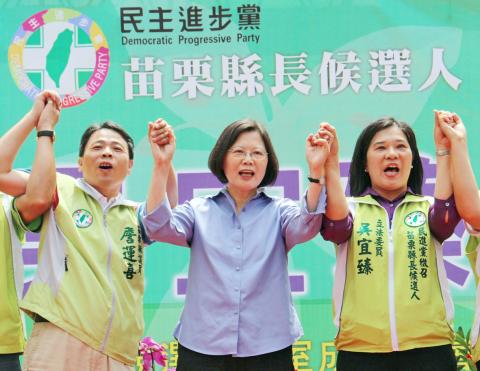Democratic Progressive Party (DPP) Chairperson Tsai Ing-wen (蔡英文) and former chairman Su Tseng-chang (蘇貞昌) yesterday expressed their disapproval of calls to freeze the Taiwanese independence clause in the party’s charter, a day before a party meeting scheduled for a discussion on the proposed freeze.
Tsai said the independence clause has been the party’s objective since its foundation, and it is also the ideal that party members and most Taiwanese have been pursuing.
With Taiwan’s democratization, the “Taiwanese consciousness” has been determinedly formed and these values of identifying with Taiwan and insisting on the nation’s independence and autonomy have already become a “natural ingredient” of the younger generation, Tsai said.

Photo: CNA
“How are we to freeze or abolish this fact or state?” she asked.
Tsai responded to the recent calls to suspend the independence clause yesterday on Google Moderator, a service that helps crowdsource questions and determine which questions interest users the most.
The DPP has been using it as an open platform to engage people on public policy.
She said the reason cited by those who propose mothballing the independence clause has always been the worry that the DPP would not be able to deftly deal with issues concerning cross-strait relations.
“This is a myth,” Tsai said. “People have to ask the question of who really defines the so-called Taiwanese independence framed by the media. Are we not an independent nation? Isn’t consolidating our sovereignty and demanding more substantive participation in the international arena what most Taiwanese are calling for?”
Tsai said the Resolution on Taiwan’s Future (台灣前途決議文) has been the consensus within the party about Taiwan’s sovereignty, future and relationship with China, and it has also become a consensus among the Taiwanese public.
“The DPP, based on this consensus, is aiming for a cross-strait relationship that is more stable and consisting of quality interaction and mutual trust,” she added.
She said that the DPP would be more confident, positive and practical in its attitude and measures, “showing its stability and consistency.”
The party would continue insisting on the principle and position that cross-strait interactions, regardless of form, should not be allowed to damage Taiwan’s democracy, sovereignty or Taiwanese will to determine their own future, Tsai said.
Separately, Su wrote on Facebook yesterday that Taiwan is an independent nation and that its future is in the hands of its 23 million people.
It is the mainstream public opinion, a social consensus of the highest degree and the DPP’s longstanding principle, Su added.
He said that the party’s 2014 China Policy Review: Summary Report (對中政策檢討機要) released in January was the result of scores of conferences with thorough discussions involving more than 600 people that spanned several months. The conclusion has confirmed the fortitude of the DPP’s basic values and core stance.
“The DPP should have confidence in its stance and in Taiwan’s mainstream opinion, clarifying its attitude [whenever needed] to avoid unnecessary misunderstanding from the outside and confusion within the party,” Su wrote.

AGING: As of last month, people aged 65 or older accounted for 20.06 percent of the total population and the number of couples who got married fell by 18,685 from 2024 Taiwan has surpassed South Korea as the country least willing to have children, with an annual crude birthrate of 4.62 per 1,000 people, Ministry of the Interior data showed yesterday. The nation was previously ranked the second-lowest country in terms of total fertility rate, or the average number of children a woman has in her lifetime. However, South Korea’s fertility rate began to recover from 2023, with total fertility rate rising from 0.72 and estimated to reach 0.82 to 0.85 by last year, and the crude birthrate projected at 6.7 per 1,000 people. Japan’s crude birthrate was projected to fall below six,

Conflict with Taiwan could leave China with “massive economic disruption, catastrophic military losses, significant social unrest, and devastating sanctions,” a US think tank said in a report released on Monday. The German Marshall Fund released a report titled If China Attacks Taiwan: The Consequences for China of “Minor Conflict” and “Major War” Scenarios. The report details the “massive” economic, military, social and international costs to China in the event of a minor conflict or major war with Taiwan, estimating that the Chinese People’s Liberation Army (PLA) could sustain losses of more than half of its active-duty ground forces, including 100,000 troops. Understanding Chinese

US President Donald Trump in an interview with the New York Times published on Thursday said that “it’s up to” Chinese President Xi Jinping (習近平) what China does on Taiwan, but that he would be “very unhappy” with a change in the “status quo.” “He [Xi] considers it to be a part of China, and that’s up to him what he’s going to be doing, but I’ve expressed to him that I would be very unhappy if he did that, and I don’t think he’ll do that. I hope he doesn’t do that,” Trump said. Trump made the comments in the context

SELF-DEFENSE: Tokyo has accelerated its spending goal and its defense minister said the nation needs to discuss whether it should develop nuclear-powered submarines China is ramping up objections to what it sees as Japan’s desire to acquire nuclear weapons, despite Tokyo’s longstanding renunciation of such arms, deepening another fissure in the two neighbors’ increasingly tense ties. In what appears to be a concerted effort, China’s foreign and defense ministries issued statements on Thursday condemning alleged remilitarism efforts by Tokyo. The remarks came as two of the country’s top think tanks jointly issued a 29-page report framing actions by “right-wing forces” in Japan as posing a “serious threat” to world peace. While that report did not define “right-wing forces,” the Chinese Ministry of Foreign Affairs was